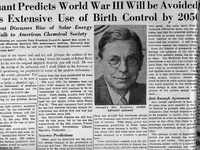The ramifications of having tainted men on the faculty were tremendous.
Self-proclaimed “Redbusters” attacked Harvard, protesting that innocent students were being indoctrinated by dangerous left-wingers.
McGeorge Bundy, future dean of the Faculty, as well as national security advisor to Presidents John F. Kennedy ’40 and Lyndon B. Johnson, was then associate professor of government and engaged in almost weekly debates on the merits of academic freedom and foreign policy with prominent visitors and fellow faculty members.
Others, however, feared engaging communism head on.
Edward S. Mason, Baker professor of economics, publicly declined an invitation from a Polish economist to attend a Moscow conference on world trade, saying he feared its intellectual basis and free discussions would be undermined by the presence of delegates from communist countries.
Multimedia
The impact of the Cold War was even felt among Harvard’s non-academic personnel. In November 1951 William J. Bingham ’16, a former director of athletics, suddenly resigned as chair of the Faculty Committee on Athletics in order to accept a position in what he termed “vital defense work” in Washington.
Bingham had served as a director of security and intelligence for the federal government during the Second World War, and now he shifted within a matter of weeks from organizing intramural athletic events at Harvard to a full-time job in national defense.
Bully Pulpit
In his final year in office, Conant was particularly outspoken about foreign affairs.
Conant was a nationally known figure. In late 1951, he ran fifth behind General Dwight D. Eisenhower in a poll of potential Republican presidential candidates.
He used his stature and prominent position to prognosticate frequently—and presciently—about the future of the Cold War. He correctly foretold that there would be no Third World War between the U.S. and the Soviet Union but that the conflict would instead play itself out in a series of “short local wars.”
Conant also accurately suggested that arms decommissioning would begin in earnest in the 1970s.
Before then, however, he advocated a strong U.S. foreign policy to counteract the Soviet threat.
“The rearmament of defense of Europe is the only way out of the atomic age,” he told students at the Law School on Oct. 16, 1951. “Once Europe is stabilized we can talk about taking bombs out of each others’ houses.”
A fervent believer in the important roles universities had to play in such a conflict, Conant concluded his final presidential report with a ringing endorsement of the value of higher education to democratic society.
“As vital centers of sound learning, as strongpoints defending individual liberty, as communities of creative thinkers, no industrialized democracy can do without them,” he wrote. “Each year will demonstrate their indispensability to this society of free men.”
—Staff writer Anthony S.A. Freinberg can be reached at freinber@fas.harvard.edu.









